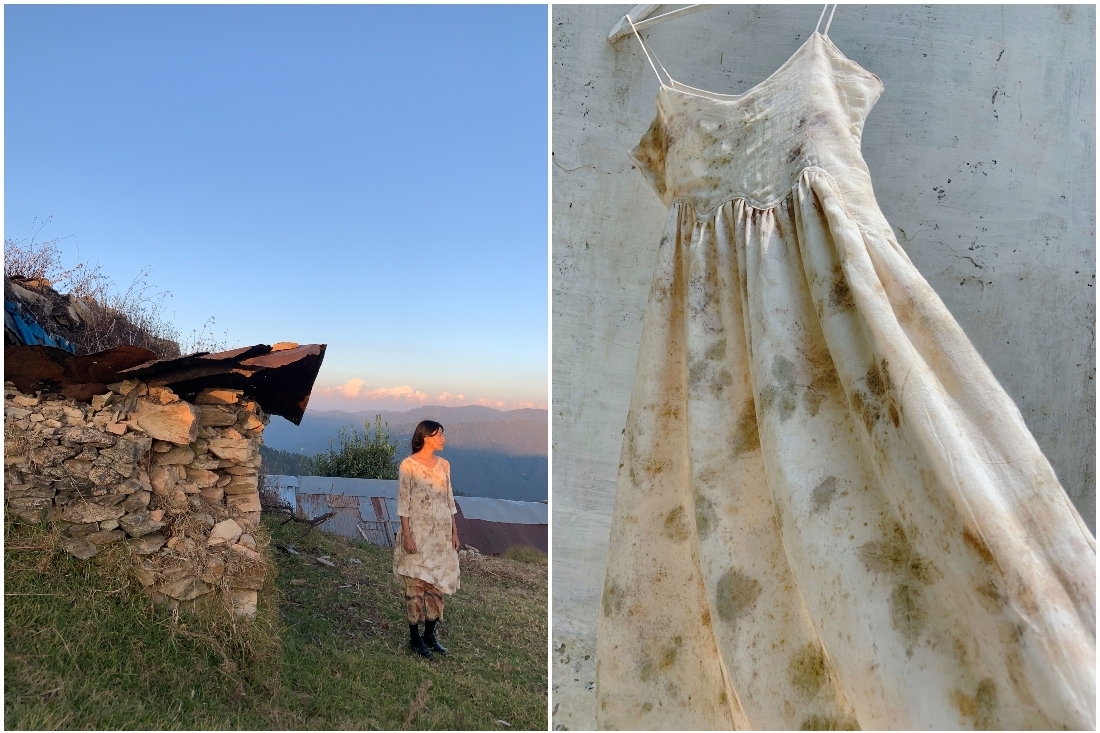

Hailing from a small hamlet in Kumaon, designer Mridu Mehra of the label kokūn lived her life out of suitcases and grew up moving from place to place, owing to the nature of her father’s work at the Indian Air Force. This constant change in environment helped her develop a keen eye, and made her very aware and adaptable. While the amount of exposure was limited, Mridu recalls finding inspiration in her father’s vinyl and cassette collections. Although as a young girl she had plans of pursuing architecture, it was her parents who pushed her towards fashion and she ended up at NIFT Mumbai. She adds ‘I was always a scribbler and a doodler. I used to draw on walls, tables, floors, my textbooks. I used to find excuses to make cards for my family and friends. My mother, a self-taught artist, always encouraged me to draw and paint. She taught me how to use colours and fall in love with art. I think that’s where I get my creativity in me from. My parents truly thought that my drawings of Betty-Veronica outfits from Archies comics was a talent.’
A solitary wanderer, hoarder of all things antique and passionate about preserving diminishing arts and cultures, the onset of her journey with design lies in these idiosyncrasies. Her curiosity piqued with lessons on and around Sanchi Stupa, Khajuraho temples and the Ellora caves. Her reading lists always consisted of details on temple architecture of Angkor Wat and Angkor Thom, Bhimbetka Shelters and the ruins of Hampi. Intrigued by the rustic, raw beauty and timelessness of prehistoric cave paintings in mesolithic architecture sites around the world, Mridu strongly began believing in the cause of handmade artistry.
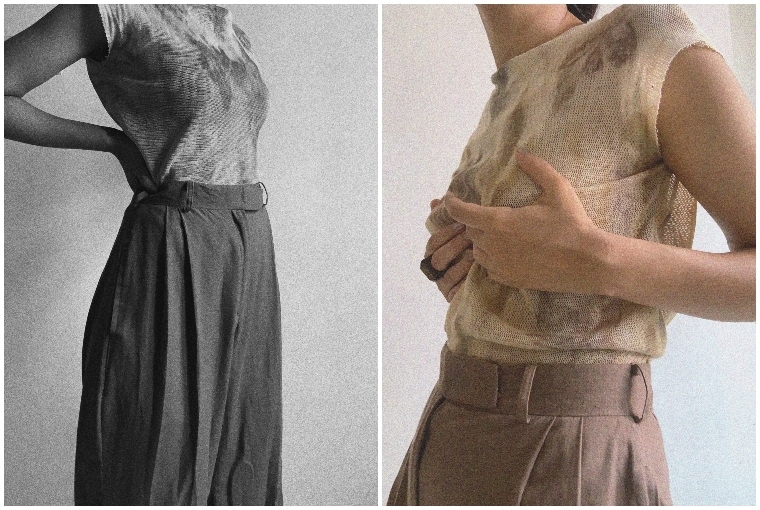
Straight out of college, the designer always felt like an outsider to the pomposity of the fashion world, leading her to trying her hand at several different initiatives. She worked on textiles for craft clusters with artisans in Gujarat, then moved on to work as a freelance web and fashion designer, and even started her own label, Bias, in collaboration with a friend. ‘Something still felt incomplete, there was a deeper calling to push myself into something more genuine and what I truly enjoyed creating. I let go of my inhibitions of working solo and looked forward to having freedom to create an extension of myself. Something that is not dictated by trends or people, and expresses the humble language that resides in me,’ says Mridu.
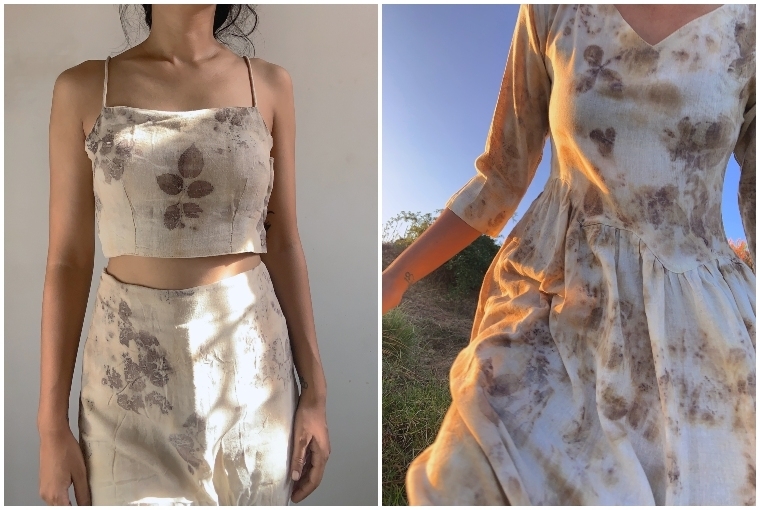
Thus, kokūn was born during the pandemic out of intrigue about processes that flow organically, and the techniques of slow stitching, zero waste, natural dyeing, and sustainable fabrics joined the narrative. The label finds itself deeply rooted in nature in terms of inspiration and the processes. Each garment is quirky and distinct, and no piece is identical to the other. Mridu explains, ‘The process of creation takes time and effort to implement. This limitation also acts as an inspiration, as it creates a new value system and makes us see colours the way we’ve never seen before, or rethink fashion the way we have not perceived before. It makes us more conscious of the way we live, create and consume.’
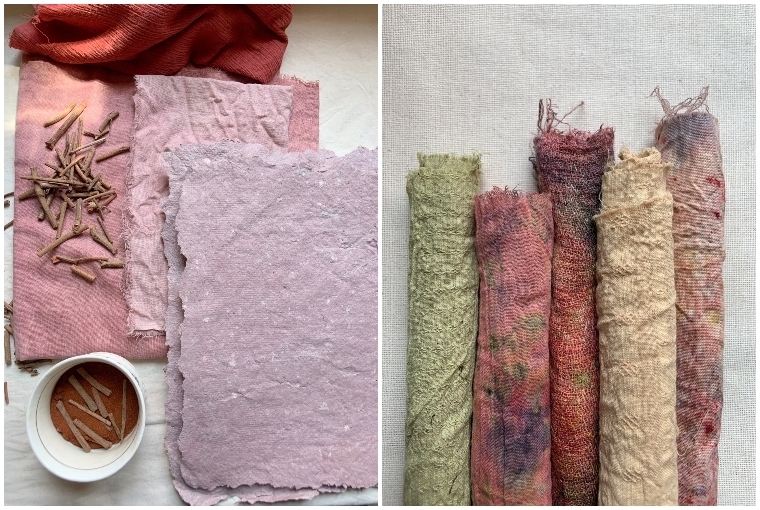
The label’s team comprises the head masterji, his wife, a skilled seamstress and one assistant tailor to manage the production process. The designer breaks it down further, ‘My help, Kala, assists me in everything I do. We make sure to not discard any scrap of fabric and reuse off-cuts by patching them with hand-needle and thread techniques, Sashiko and Kantha. This work is outsourced by employing women from marginalised communities in Lucknow. For printing and dyeing the leaves are sourced locally from my kitchen garden or through parks, sometimes even kitchen waste like pomegranate, onion peels and tea. I also grow my own plants in my garden like hibiscus, butterfly pea flower and roses. Our fabrics are sourced directly from different weavers in West Bengal, especially DAMA or Khadi Gram Udyog for handlooms.’
Sampling plays a primary role in the entire process, post which, each piece is made on order to minimise wastage. The label does not stock up inventory and loves customising, to cater for different body sizes. As an antithesis to fast-fashion, Mridu wishes for the wearer to establish a connection with each of their garments, specially handmade for them.
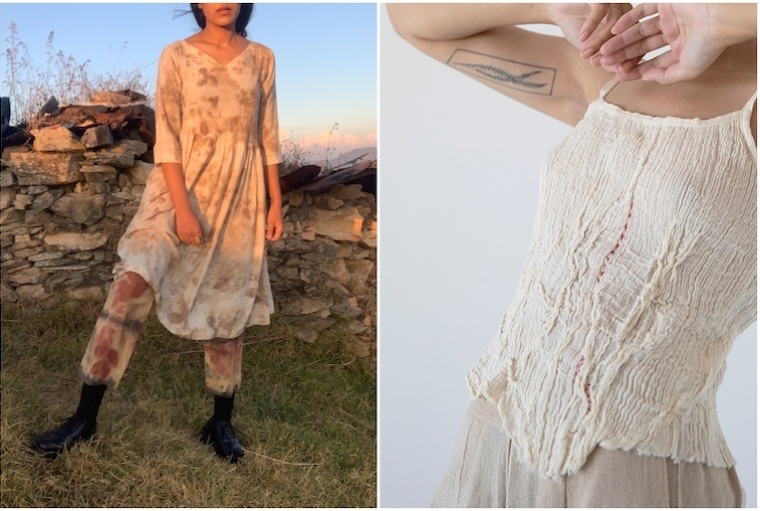
Inspired by the Wabi Sabi philosophy, she finds herself incorporating it in not just design, but her thought process and daily life as well. The outlook has helped her find appreciation for nature, its oddities, its rawness and imperfections. She elucidates, ‘I look upto strong women. My natural-dyeing community of creators and my fellow seekers constantly inspire me. For me, good design and sustainability are inseparable. Exploring, learning, unlearning, trusting instincts is it for me. I go back to my home in Uttarakhand and grow plants, fruits, vegetables, chillies, and make chutneys on a sil batta. I extract pigments, colours from flowers, leaves, barks, seeds and teach village kids. There I am present, I enjoy life and live ordinarily, and that is pretty much my creative process. Away from city life, away from the noise.’
The pandemic brought a lot of changes with it for team kokūn. They found a way to make do with the least amount of resources. Mridu further had to shut the studio in Delhi and shift everything to her room at her parent’s house. While the unit temporarily works from this new setup, it has definitely slowed them down. However, they continue to create new samples and make what resonates the most, and consciously shifting away from over producing. The future holds an upcoming home line involving ahimsa silk, and a stationery line produced using recycled newspapers, with the help of village communities near Lucknow.
Text Unnati Saini